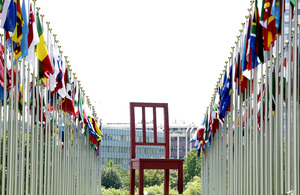Review launched to reduce red tape for UK researchers
- Government launches new independent review into UK research bureaucracy to identify ways to free up researchers to pursue world class research
- led by Professor Adam Tickell, Vice Chancellor, University of Sussex, the review will make recommendations to remove unnecessary red tape in the UK research system
- delivers on the commitment in the UK’s ambitious R&D Roadmap to minimise bureaucracy and help cement the UK’s status as a science superpower
Removing unnecessary red tape that wastes the time of UK researchers will be the focus of a new independent review into research bureaucracy, launched today (Monday 22 March 2021) by Science Minister Amanda Solloway.
The review, led by Professor Adam Tickell, Vice-Chancellor of the University of Sussex, will seek to identify why bureaucracy has increased across the UK’s research system. It will provide recommendations to help reduce time-consuming administrative demands, freeing up researchers to pursue world-class research, so that they can generate knowledge, develop and mentor their teams, and make a full contribution to the wider research community.
It will look to identify practical solutions to bureaucratic issues faced by researchers across the UK such as overly complicated grant forms that require in-depth financial knowledge, a lack of clarity over funding available to researchers, and having to provide the same data multiple times in different formats to different funders.
Its recommendations will balance safeguarding the need to demonstrate impact and value for money while supporting the UK research environment, particularly higher education institutions, to be more streamlined, dynamic, diverse and transparent.
Amanda Solloway, Minister for Science, Research and Innovation, said:
The UK is home to some of the world’s leading scientists and researchers and their response over the past year to the coronavirus pandemic has shone a light on the vital need for them to be able to carry out their ground-breaking work at pace. Their discoveries have created much needed medical treatments and vaccines which are saving lives across the world.
As we build back better by unleashing innovation, it’s crucial that we create a research environment that harnesses this same scientific speed and endeavour. This review will identify how we can free up our brightest minds from unnecessary red tape so they can continue making cutting edge discoveries, while cementing UK’s status as a science superpower.
Professor Adam Tickell, University of Sussex, said:
I am very pleased to have been asked to lead this review of such great importance to my colleagues in the sector and to the UK as a whole. I am looking forward to engaging across the research community to get a complete picture of the issues from all perspectives and in coming up with ways to improve the way our systems work. Ultimately, this should translate to making a real difference to the work of our research teams and that will be the true test of whether we have succeeded.
The system-wide review will conclude by early 2022, with interim findings due to be published this autumn. It will involve broad engagement with the whole UK research community, with a particular focus being placed on research undertaken in higher education institutions.
The government’s R&D Roadmap, published in July 2020, set out the government’s ambitious vision for the future of UK R&D, including the goal of minimising bureaucracy whilst maintaining flexibility, diversity and necessary accountability. This review is the next phase in delivering on that commitment.
It builds on the government’s introduction of specific measures in September 2020 by UK Research and Innovation (UKRI), the National Health Institute for Research (NIHR) and the Office for Students (OfS) to reduce bureaucracy in the university research and teaching system. This included streamlining over 200 UKRI grant schemes and introducing a digital grants application system to speed up the process.
Ottoline Leyser, CEO of UK Research and Innovation, said:
UKRI welcomes this independent and system-wide review to enable a reduction in unnecessary research bureaucracy, wherever it is found. The goal is to free up time for researchers and innovators to devote to their many vital roles at work and outside it.
We are already making strides within our Simpler and Better Funding programme, which aims to make the funding process as user-friendly as possible for applicants, peer reviewers and awardees, as well as those who work with them.
We look forward to supporting BEIS in delivering this review, and working with them to create a research and innovation system that delivers for everyone.
Professor Julia Buckingham, President of Universities UK and Vice-Chancellor of Brunel University London, said:
We very much welcome the opportunity to challenge the parts of the research system which can restrict university staff and students from delivering impactful research.
It is excellent to see that Professor Adam Tickell, Vice-Chancellor of the University of Sussex, will be leading this review and that a system-wide approach to tackling bureaucracy will be used. This approach will drive meaningful change across the sector, promoting diversity and empowering researchers with the time they need to pursue ambitious research.
The outcomes of this review will further increase the attractiveness of UK universities as partners for global collaboration.
View the full Terms of reference for the review.

